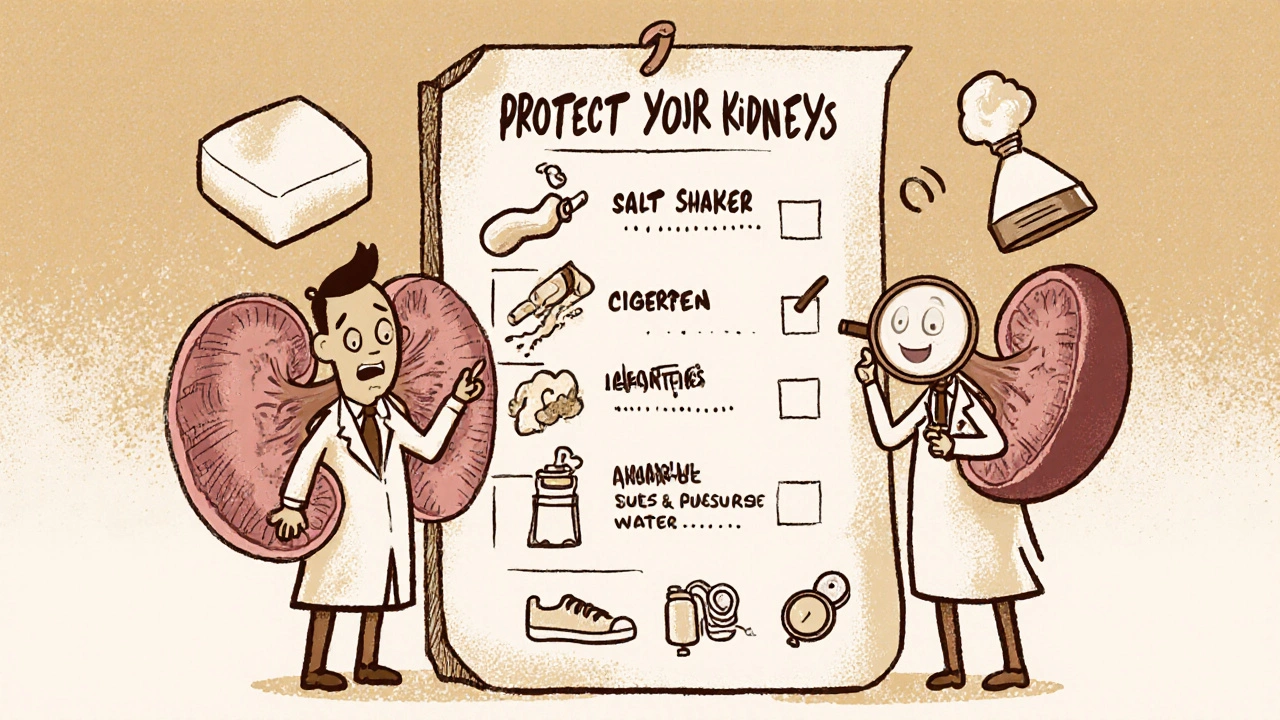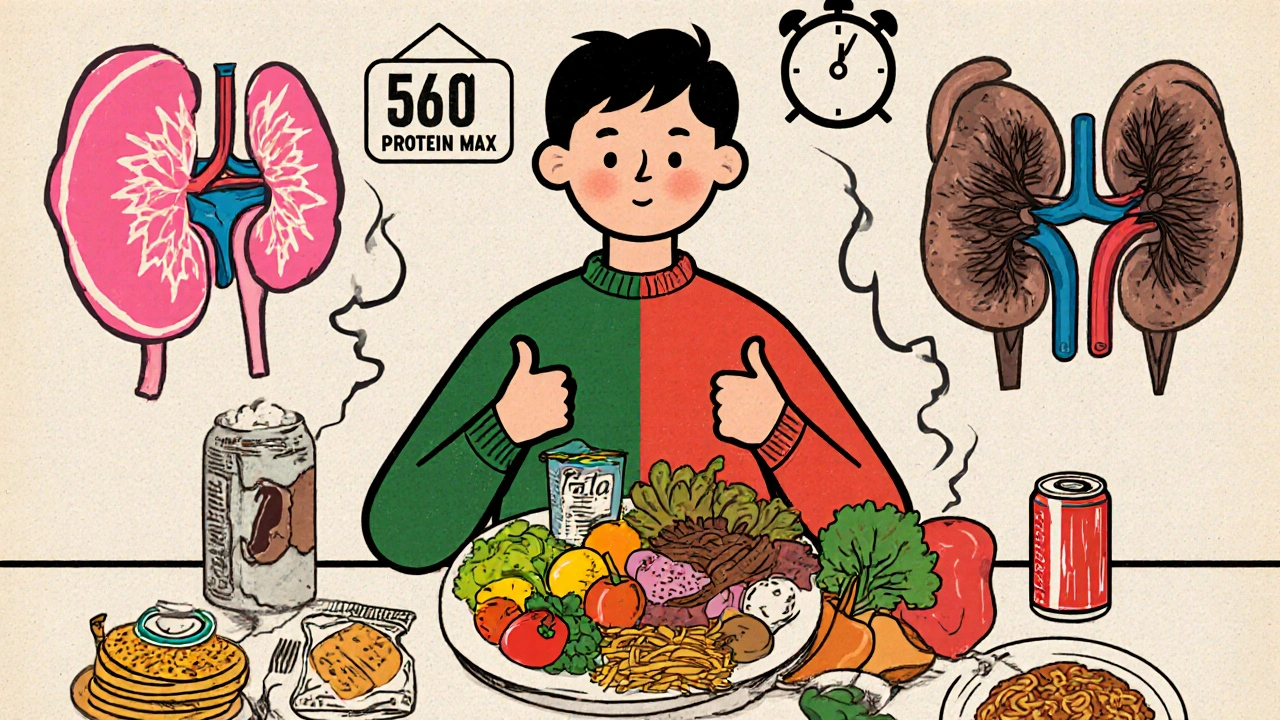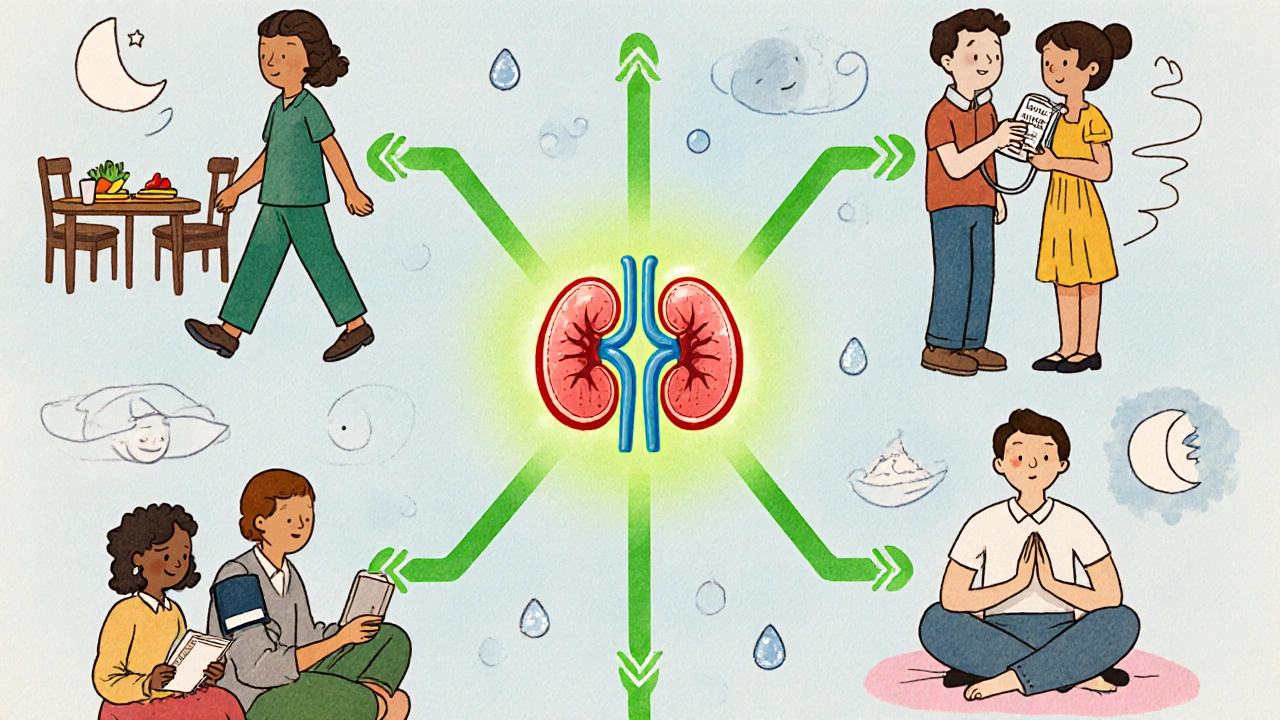Preventing Kidney Disease: Key Risk Factors and Proven Lifestyle Changes
 Nov, 24 2025
Nov, 24 2025
One in three adults in the U.S. has a risk factor for kidney disease - and most don’t even know it. Chronic kidney disease (CKD) doesn’t come with warning signs until it’s far advanced. By the time symptoms like fatigue, swelling, or changes in urination show up, the kidneys may already be badly damaged. The good news? Up to 85% of kidney disease cases can be prevented or delayed with simple, everyday choices. You don’t need a miracle cure. You need to know what’s harming your kidneys and how to stop it.
What Actually Damages Your Kidneys?
Your kidneys filter about 120 to 150 quarts of blood every day. They remove waste, balance fluids, and help control blood pressure. When they’re under constant stress, they start to fail. The biggest threats aren’t mysterious toxins or rare diseases - they’re common, everyday conditions.
Diabetes is the leading cause of kidney failure. About 40% of people with kidney failure in the U.S. have diabetes. High blood sugar slowly scars the tiny filters in your kidneys, making them leak protein and lose function. Hypertension is the second biggest culprit. About 68% of people with CKD also have high blood pressure. When your blood pressure stays too high, it stretches and weakens the blood vessels in your kidneys, reducing their ability to filter properly.
Obesity is a silent driver. Extra weight doesn’t just strain your heart - it increases insulin resistance, raises blood pressure, and pushes your kidneys to work harder. Losing even 5 kg (about 11 pounds) can cut your risk of kidney disease by 25% to 30%. Smoking is another major factor. Smokers see kidney function decline 50% faster than non-smokers. The chemicals in tobacco narrow blood vessels, reduce blood flow to the kidneys, and speed up scarring.
Then there’s overuse of painkillers. Daily use of NSAIDs like ibuprofen or naproxen - even just a few pills a week - can cause kidney damage over time. These drugs reduce blood flow to the kidneys, and for people with existing risk factors, they can trigger new kidney disease. About 3% to 5% of new CKD cases each year are linked to these medications.
What You Should Eat (and What to Avoid)
Diet isn’t about strict rules or expensive superfoods. It’s about balance and avoiding the things that push your kidneys toward failure.
Start with sodium. Most people eat more than 3,400 mg a day. The target for kidney health? Under 2,300 mg. That’s about one teaspoon of salt. Cut back on processed foods - canned soups, frozen meals, deli meats, and salty snacks are loaded with hidden salt. Read labels. Choose low-sodium versions. Cook at home more often. Your kidneys will thank you.
Sugar is just as dangerous. Sugary drinks - sodas, energy drinks, sweetened teas - make up 7% of daily calories for most American adults. That sugar turns to fat, spikes insulin, and raises your risk of diabetes and obesity. Swap them for water, unsweetened tea, or sparkling water with a slice of lemon.
Protein intake matters too. Eating too much protein - especially red meat and processed meats - forces your kidneys to work overtime. Aim for lean sources like fish, chicken, beans, and tofu. Most adults need about 0.8 grams of protein per kilogram of body weight. If you weigh 70 kg (154 lbs), that’s about 56 grams a day. More than 1.2 grams per kg can strain your kidneys, especially if you already have early-stage disease.
Fruits and vegetables are your allies. Eat at least five portions a day. They’re rich in fiber, antioxidants, and potassium - which helps balance sodium and lower blood pressure. A single apple, a banana, a handful of spinach, a carrot, and a cup of berries counts as five. No need to go full vegan. Just make half your plate plants.
Move More, Sit Less
You don’t need to run a marathon. You just need to move consistently.
The CDC and NHS both recommend 150 minutes of moderate exercise each week. That’s 30 minutes, five days a week. Brisk walking, cycling, swimming, or dancing all count. Add strength training twice a week - lifting weights, using resistance bands, or doing bodyweight exercises like squats and push-ups. This helps control blood sugar, lowers blood pressure, and reduces body fat.
If 30 minutes feels overwhelming, start with 10. Walk after dinner. Take the stairs. Park farther away. Stand up every hour if you sit at a desk. These small shifts add up. Studies show that people who move regularly cut their risk of kidney disease by 30% compared to those who are inactive.
Exercise also helps with sleep and stress - two hidden factors in kidney health. Poor sleep raises blood pressure. Chronic stress spikes cortisol, which worsens insulin resistance and inflammation. Find movement you enjoy. It doesn’t have to be a gym. It can be gardening, playing with your kids, or a weekly dance class.

Medications, Alcohol, and Smoking
Medications can help - or hurt. Always check with your doctor before taking new pills, even over-the-counter ones. NSAIDs like ibuprofen are fine occasionally, but daily use is risky. If you have high blood pressure or diabetes, ask for alternatives like acetaminophen (Tylenol), which is safer for kidneys when used as directed.
Alcohol isn’t the enemy - but too much is. One drink a day for women, two for men. That’s one 12-ounce beer, 5 ounces of wine, or 1.5 ounces of hard liquor. Excess alcohol raises blood pressure and contributes to 20% to 30% of hypertension cases. It also adds empty calories, leading to weight gain and fatty liver - both linked to kidney damage.
Smoking is non-negotiable. If you smoke, quitting is the single best thing you can do for your kidneys. Within a year of quitting, your risk of kidney function decline drops significantly. Talk to your doctor about nicotine replacement, counseling, or apps that help you quit. Don’t wait for a diagnosis. Quit now.
Screening and Monitoring: Don’t Wait for Symptoms
Kidney disease has no early symptoms. That’s why screening is critical - especially if you have diabetes, high blood pressure, obesity, or a family history of kidney failure.
Ask your doctor for two simple tests: a urine test for albumin (a protein that shouldn’t be there) and a blood test for creatinine (used to calculate your GFR - glomerular filtration rate). These tests cost less than $50 and take minutes. If you’re at risk, get them at least once a year.
If you have diabetes, check your A1C at least twice a year. Aim for under 7% - but your doctor may set a different target based on your age and health. Keep your blood pressure at or below 120/80 mm Hg. If you’re on medication, take it as prescribed. Don’t skip doses because you “feel fine.” Kidney damage happens quietly.
Telehealth tools are making monitoring easier. Remote blood pressure cuffs and glucose monitors can send data directly to your doctor. One 2021 study showed that patients using these tools improved medication adherence by 37%.

Stress, Sleep, and the Bigger Picture
Your kidneys don’t work in isolation. They’re tied to your heart, your brain, your sleep, and your emotions.
Chronic stress raises cortisol, which increases blood pressure and blood sugar. Studies from Johns Hopkins show that people who practice mindfulness, meditation, or deep breathing for just 10 minutes a day slow kidney disease progression by 15%. You don’t need an hour of yoga. Just sit quietly, focus on your breath, and let go of the noise.
Sleep is equally important. People who sleep less than six hours a night have a higher risk of developing CKD. Poor sleep disrupts hormones that regulate blood pressure and fluid balance. Aim for seven to eight hours. Turn off screens an hour before bed. Keep your room cool and dark.
And don’t forget vaccines. People with kidney disease are 3 to 5 times more likely to get seriously ill from the flu. Get your annual flu shot. Stay up to date on pneumonia and COVID-19 vaccines. Your immune system is already working hard - don’t give it more to fight.
It’s Not About Perfection - It’s About Progress
You don’t have to overhaul your life overnight. Start with one change. Cut out sugary drinks. Walk for 15 minutes after dinner. Read food labels. Check your blood pressure at home once a week.
Small steps build momentum. The NHS Diabetes Prevention Programme found that people who made just two or three lifestyle changes reduced their risk of developing diabetes by 26%. And since diabetes causes 40% of kidney failure, that’s a direct win for your kidneys.
Prevention works best early. If you’re in the early stages of kidney disease (Stages 1 or 2), lifestyle changes can stop or even reverse damage. By Stage 4, the options shrink. That’s why waiting is dangerous.
Think of your kidneys like a car engine. You don’t wait until it’s smoking to change the oil. You do it regularly. Your kidneys need the same care. Healthy eating, movement, sleep, stress management, and regular checkups aren’t optional. They’re your best defense.
And if you’re reading this because someone you love has kidney disease - you’re not powerless. Help them cook meals, walk with them, remind them to take their meds. Your support matters more than you know.
Can you reverse early kidney disease with lifestyle changes?
Yes, in the early stages (Stages 1 and 2), lifestyle changes can stop or even reverse kidney damage. Controlling blood pressure, managing blood sugar, losing weight, and reducing sodium intake have been shown to improve kidney function. Studies show that people who make these changes early can reduce protein leakage in urine and stabilize their GFR. The key is acting before scarring becomes permanent.
Is drinking a lot of water good for your kidneys?
Drinking enough water helps your kidneys flush out waste, but there’s no magic number. Most healthy people need about 8 cups (2 liters) a day, but this varies by body size, activity level, and climate. Overhydration doesn’t protect your kidneys - and can be dangerous for people with advanced kidney disease. The best rule: drink when you’re thirsty, and aim for pale yellow urine. Dark urine means you need more fluids.
Are herbal supplements safe for kidney health?
No - many herbal supplements can harm your kidneys. Products like aristolochic acid (found in some traditional remedies), creatine, and high-dose vitamin C can cause kidney injury. Even popular herbs like licorice root or green tea extract in pill form can raise blood pressure or interfere with medications. Always talk to your doctor before taking any supplement, especially if you have high blood pressure, diabetes, or existing kidney issues.
How often should I get my kidneys checked?
If you have diabetes, high blood pressure, obesity, or a family history of kidney disease, get tested at least once a year. Tests include a urine albumin-to-creatinine ratio and a blood test for creatinine to calculate your GFR. If you’re healthy and have no risk factors, testing isn’t routine - but it’s still a good idea after age 50, especially if you’re taking regular painkillers or have a history of urinary tract infections.
Does kidney disease run in families?
Yes. If a close relative has kidney failure, your risk increases. Conditions like polycystic kidney disease are inherited, but even non-genetic forms like diabetic kidney disease can cluster in families due to shared habits - diet, activity levels, and weight. If you have a family history, get screened early and encourage relatives to do the same. Genetic testing is available for some inherited forms, but lifestyle changes still offer the strongest protection.
Can kids get kidney disease from poor habits?
Yes. Childhood obesity and type 2 diabetes - once rare in kids - are now major causes of early kidney damage. High-sugar diets, sedentary lifestyles, and processed foods are putting children at risk decades earlier than before. Parents can protect their kids by limiting sugary drinks, encouraging daily movement, and modeling healthy eating. Early prevention saves lives - and kidneys - for the long term.
What to Do Next
Start today. Write down your three biggest risk factors: Is it high blood pressure? Sugar-heavy meals? Sitting all day? Pick one to change this week.
Download a free app to track your sodium intake or water consumption. Set a daily walking alarm. Swap one sugary drink for water. Ask your doctor for a simple kidney test at your next visit.
You don’t need to be perfect. You just need to be consistent. Kidney disease doesn’t develop overnight - and neither does prevention. Small, steady actions over months and years are what protect your kidneys for life.

Emily Craig
November 25, 2025 AT 07:08Okay but like why is everyone acting like this is news 🤡 I’ve been telling my family for years to stop drinking soda and they still think it’s fine because ‘it’s just one a day’
Karen Willie
November 26, 2025 AT 08:08I love how this breaks it down without guilt-tripping. I started swapping soda for sparkling water with lemon and honestly? I feel less bloated and way more awake. Small shift, big difference.
Pallab Dasgupta
November 28, 2025 AT 07:47Bro I’m from India and we’ve been drinking chai with sugar since birth but guess what? My uncle got dialysis at 52. Now my whole family uses stevia and walks after dinner. You don’t need fancy apps, just stop being lazy.
Ellen Sales
November 29, 2025 AT 02:58I used to think ‘kidney health’ meant drinking a gallon of water every day… until I read this. Now I just drink when I’m thirsty, eat more veggies, and actually sleep. I didn’t realize my 4-hour sleep schedule was basically a slow poison. Thank you for the gentle truth.
Josh Zubkoff
November 29, 2025 AT 04:14Look I get it, but this article reads like a corporate wellness pamphlet written by someone who’s never had to choose between rent and groceries. Not everyone can afford to cook at home, buy organic produce, or take 30 minutes to walk. Meanwhile, Big Pharma is selling you ‘kidney-friendly’ supplements that cost more than your rent. This isn’t empowerment-it’s privilege porn.
fiona collins
November 29, 2025 AT 14:56Good summary. Simple, science-backed, no fluff. I’ve shared this with my elderly mum who has diabetes. She’s now checking her BP weekly. Small wins.
giselle kate
December 1, 2025 AT 05:03Of course the government wants you to think it’s just about diet and walking. Meanwhile, the water supply is laced with PFAS and the FDA approves kidney-toxic meds every year. Wake up. This is all distraction. The real enemy isn’t soda-it’s the system.
Leisha Haynes
December 2, 2025 AT 08:25lol I tried cutting sugar for a week and my coworker brought in donuts so I ate three. Then I cried. This article is nice but real life is messy and I’m tired of being shamed for it
Shivam Goel
December 3, 2025 AT 15:01Interesting how they mention NSAIDs, but don’t mention that acetaminophen can cause liver failure if overused-yet everyone treats it like a ‘safe’ alternative. There’s no perfect choice, just less bad ones. Also, did you know that artificial sweeteners might be worse than sugar for kidney function? Studies from 2022 show a correlation. Just saying.
Amy Hutchinson
December 4, 2025 AT 03:23wait so you’re telling me I can’t just take ibuprofen every time my headache hits? I’ve been doing that since college and I’m 32??
Archana Jha
December 5, 2025 AT 13:56you guys are all missing the point. the real cause of kidney disease is 5g of fluoride in the water supply. the government added it to make us docile. the same people who push ‘eat veggies’ also push fluoridation. it’s all connected. i’ve stopped drinking tap water and now i drink rainwater filtered through my socks. my gfr is up 15% in 3 months. you’re welcome.
Aki Jones
December 6, 2025 AT 22:45Let’s be real: the entire ‘lifestyle change’ narrative is a distraction from the fact that 80% of CKD cases are tied to environmental toxins-pesticides, heavy metals, air pollution. The CDC won’t admit this because it implicates agribusiness and the EPA. Meanwhile, you’re being told to ‘drink more water’ like that’s going to flush out lead from your bones. This is performative prevention.
Andrew McAfee
December 7, 2025 AT 03:52As a Nigerian-American, I’ve seen how our elders eat salty smoked fish and never get kidney disease. But their kids? Soda, fries, and no movement. Culture shift, not just diet. We need to bring back the old ways, not buy into Western wellness trends.
Andrew Camacho
December 8, 2025 AT 21:42Okay but let’s be honest-how many people reading this even have access to a doctor? I work two jobs, my insurance deductible is $7K, and the nearest clinic is 40 miles away. You want me to ‘get tested’? Cool. Can you pay for my gas? Because I can’t afford to miss a shift to sit in a waiting room for three hours. This advice is beautiful. And useless to 60% of America.
Jennifer Griffith
December 10, 2025 AT 16:10wait so i can’t eat pizza anymore? i mean like… one slice? come on